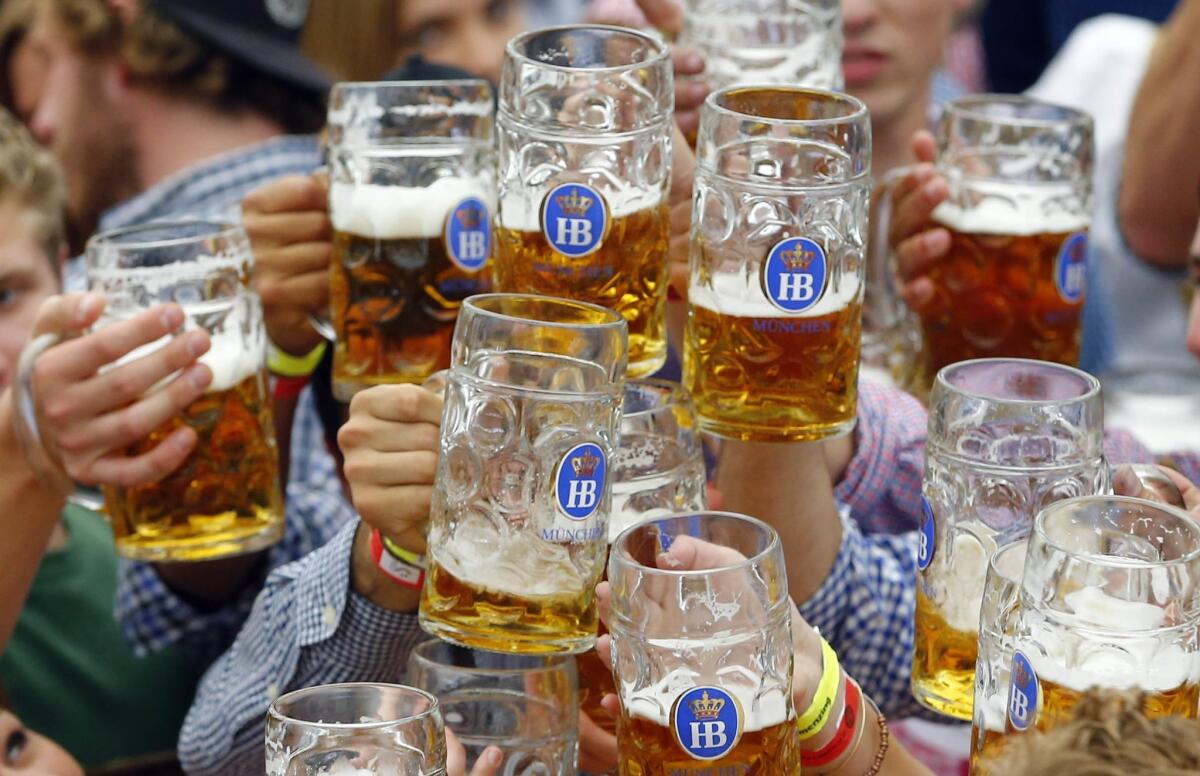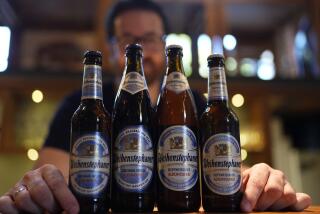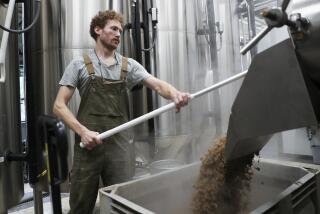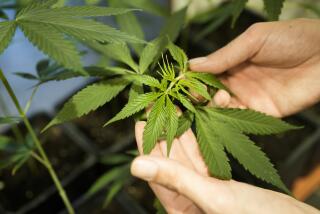The law has kept German beers pure for 500 years. That might not be enough to save them

People celebrate the opening of the Oktoberfest beer festival in Munich, Germany, on Sept. 19, 2015.
Reporting from Berlin ‚ÄĒ For 500 years, Germany‚Äôs famous Beer Purity Law has been protecting the country‚Äôs beer drinkers from contaminants, chemicals and any other additives that unsavory merchants might have thought of adding.
But the law, or Reinheitsgebot, which marked its 500th anniversary on Friday, has been unable to protect the country’s 1,350 brewers and the proud industry from a modern plague: health consciousness.
Beer consumption is dwindling in Germany, falling by an alarming rate of about 30% over the last 25 years as younger Germans have increasingly turned away from the country‚Äôs most famous beverage despite the famous law that bans anything but four ingredients ‚ÄĒ water, hops, malt and yeast ‚ÄĒ from being used to make beer here.
The country’s per-capita beer consumption fell from 37 gallons a year in 1991 to 25 gallons in 2015. (By comparison, U.S. annual beer consumption is just under 20 gallons per person.)
‚ÄúGermans are drinking a lot less beer nowadays in pursuit of modern trends like wellness, sports and living healthy,‚ÄĚ said Friedel A. Drautzburg, the owner-operator of one of Berlin‚Äôs most popular pubs, the Staendige Vertretung. ‚ÄúOn top of that, it‚Äôs become a real social turn-off to be buzzed, or a little drunk and/or very drunk. Thirty or 40 years ago, it was socially acceptable to get blitzed. Not anymore.‚ÄĚ
Drautzburg, 78, said that between 500 and 800 people come into his establishment in the government quarter each day, which represents a solid annual increase over the years, but that beer sales have been slipping as people turn to non-alcoholic beverages.
He sells about 48,000 gallons per year.
‚ÄúWe‚Äôve got to be realistic and sober about the fact that people want to live longer nowadays and they see cutting down on the alcohol as one of the keys to longevity,‚ÄĚ added Drautzburg, who said he stopped drinking alcohol himself 40 years ago ‚Äúbecause I realized I was someone who couldn‚Äôt be reasonable about drinking. I managed to stop in time. Many of my friends from back then didn‚Äôt and they‚Äôre no longer alive.‚ÄĚ
The beer industry is still very much alive in Germany, a country that despite the erosion in sales still produced about 2.6 billion gallons of the beverage ‚ÄĒ of which more than 350 million gallons, or more than $1 billion worth, were exported. Italy, France, the Netherlands, China and the United States were the main buyers.
The Beer Purity Law was decreed on April 23, 1516, by Munich’s Duke Wilhelm in the Bavarian town of Ingolstadt amid concerns that contaminants such as soot, poisonous roots and sawdust were being added to beer. The law was also aimed at preventing crops used to make bread from being wasted on brewing. The Reinheitsgebot has become a symbol of high-quality German beer, even though some critics have said it has actually been a form of protectionism to keep other beers from the German market.
Chancellor Angela Merkel was celebrating the anniversary of the law ‚ÄĒ said to be the oldest existing regulation governing food or beverages ‚ÄĒ in Ingolstadt on Friday.
In her speech to beer industry leaders after taking a big sip from a glass of alcohol-free beer, Merkel first quoted Martin Luther by saying: ‚ÄúIf you don‚Äôt have a beer, you don‚Äôt have anything to drink.‚ÄĚ She was full of praise for German beer and its strong export sales. She drew laughter and applause by quoting a former chancellor, Otto von Bismarck, who said: ‚ÄúWhile drinking beer, there‚Äôs an inherent desire for people to criticize their government.‚ÄĚ
‚ÄúI don‚Äôt really like the taste of beer or alcohol,‚ÄĚ said Marlene Schmidt, a 25-year-old Berlin student enjoying a warm spring day in the center of the city. ‚ÄúI guess it‚Äôs just a generational thing. Young people just aren‚Äôt into beer the way our parents are. Germany has been a beer country for so long, but it‚Äôs not really a cultural symbol for anyone under 35 or 40.‚ÄĚ
Schmidt said she drinks the equivalent of about a pint of beer a week, while her parents average that much in a day.
‚ÄúWhen I was in high school we made beer once as a chemistry project ‚ÄĒ it was part of our good German education,‚ÄĚ she said with a wry laugh. ‚ÄúI was only 16 at the time, and we got to drink it when it was finished. It tasted pretty good then. But it‚Äôs just not something young people really want to drink anymore.‚ÄĚ
That is the attitude that has the country’s brewers scared. In a country where the drinking age is 16 and beer used to be available from automatic machines, they have been rushing to develop mixed beer drinks and alcohol-free beers, proudly pointing to steady increases in those niche-market sales while the overall total of beer consumption in Germany shrinks each year.
The falling consumption has also lead to a price war in some regions, with prices tumbling to less than 50 cents for a pint bottle of beer ‚ÄĒ about half the price of bottled water in some shops.
‚ÄúI used to have a few beers each week but not anymore,‚ÄĚ said Diane Adamsky, a 47-year-old woman who delivers flowers in Berlin and has gone from drinking about a quart of beer a week to nearly zero. ‚ÄúThere are so many other mixed drinks available now that taste so much better. Beer might be a big deal in Germany, but it‚Äôs fine with me if people are drinking less beer. That‚Äôs just the way it goes.‚ÄĚ
But to Heiko Maecken, a 53-year-old financier, there is no better way to finish off the day than with a cool, fresh tap beer.
‚ÄúI‚Äôve always loved a good beer and am definitely not drinking any less than 30 years ago,‚ÄĚ said Maecken, who believes he drinks about a pint a day. ‚ÄúBeer in Germany is good for your health. It‚Äôs got important nutrients and is definitely healtier than soft drinks, smoothies or mixed drinks. I don‚Äôt like any of that stuff. My four daughters drink all that. It‚Äôs not for me though. I‚Äôll take a lovely fresh beer off the tap over anything else.‚ÄĚ
Kirschbaum is a special correspondent.
ALSO
Cuba running out of beer because of American tourists
The best beers to drink with fried chicken: Chefs and beer pros offer their picks
Ballast Point’s Sculpin leads San Diego craft beers to robust growth in 2015
More to Read
Sign up for Essential California
The most important California stories and recommendations in your inbox every morning.
You may occasionally receive promotional content from the Los Angeles Times.










